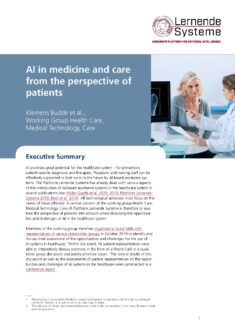AI in medicine and care: patients see more opportunities than risks

Munich, 27 October 2020
Artificial Intelligence (AI) can improve health care and support nurses and doctors in diagnoses and therapy decisions. Patient representatives see the use of AI-based assistance systems in medicine and nursing predominantly as an opportunity. This is the result of a qualitative survey, which Plattform Lernende Systeme presents in a current conference report. The majority of those questioned hope for more personalised treatment and a more comprehensive and faster diagnosis. The patient representatives name the misuse of their data and incorrect or discriminatory decisions made on the basis of AI systems as risks.
By exchanging information with patient representatives, Plattform Lernende Systeme is making an important contribution to a broad social dialogue on Artificial Intelligence. “People will only accept AI-based assistance systems and their advantages if they trust them. That is why the first step on the way to better healthcare with AI is to learn about the needs and requirements of patients for the technology and to take these into account when developing AI systems,” says Klemens Budde, senior consultant at Charité Berlin and head of the Health Care, Medical Technology, Care working group of Plattform Lernende Systeme. “A central concern of our working group is to focus on the patients’ perspective when discussing the opportunities and challenges of AI in medicine”.
Overall, the conference report states that patient representatives are open to AI technologies in the health care system. Those surveyed expect AI systems to support them in their everyday lives, whether through health apps that promote a healthier lifestyle or in the form of care robots. They also see the AI-supported evaluation of large amounts of health data from various sources as an advantage, which can speed up the diagnosis and subsequently the recovery of people. Patient representatives also welcome the personalised therapy made possible by AI systems that compare patient information with data from similar patients.
Access to the electronic patient file by those concerned was also of particular importance. The health data from regular care stored on it is considered a valuable data source for the use of AI. The information should be accessible to patients at all times without barriers. It is to be expected that people will therefore access their health data more frequently than in the past, where the analogue file had to be requested for this purpose. However, the medical information they are confronted with there can quickly be misinterpreted and make people feel insecure. Therefore, contact points should be created to answer patients’ questions about this information, according to the respondents.
Ultimately, the conference report states that good information opportunities strengthen the participation of those affected in medical and nursing decisions. The patient representatives would like to see educational programmes on how to handle their own health data and to be more involved in the development of AI technologies in the health care system.
About the conference report
In October 2019, the Health Care, Medical Technology, Care working group of Plattform Lernende Systeme, in cooperation with the German Research Institute for Artificial Intelligence (DFKI), organised a round table with various patient representatives. The participants jointly discussed the opportunities and risks of using AI in healthcare. The perceptions and opinions of patient representatives were collected in a multi-stage, qualitative survey.




